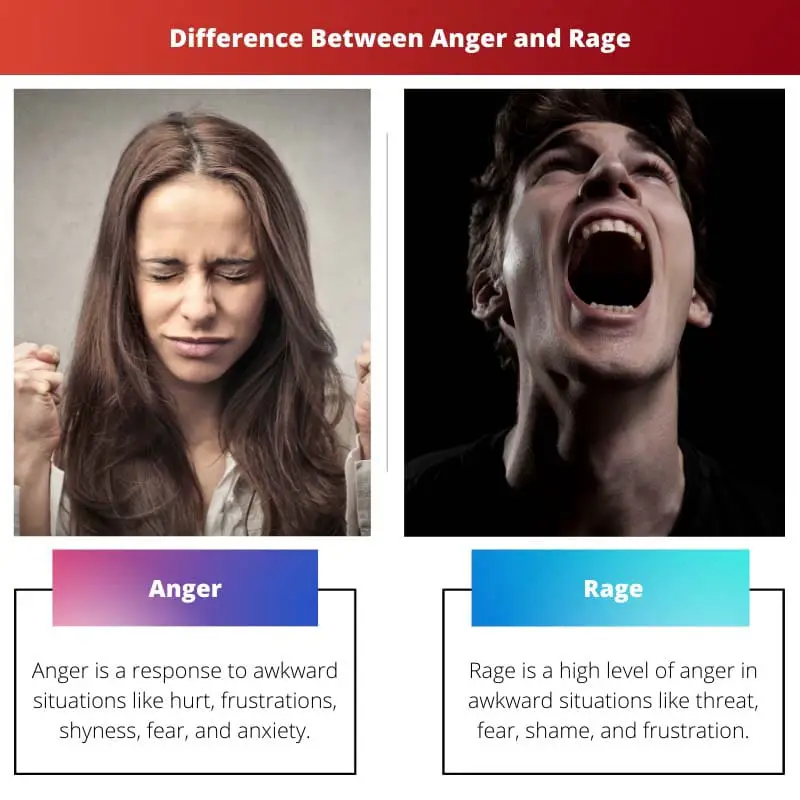Emotions are human feelings that change their behaviour towards someone or something. Anger is one type of human emotion that is faced by everyone in daily life.
However, the level of intensity of anger has a different impact on oneself and his relationships. Anger and rage are different terms used to define the level of intensity of anger.
Key Takeaways
- Anger is a feeling of annoyance or displeasure caused by a perceived injustice or wrongdoing, while rage is a more intense and violent form of anger.
- Anger can be expressed healthily and constructively, while rage is uncontrollable and leads to destructive behavior.
- Learning to manage anger and express it healthily rather than letting it escalate into a rage is essential.
Anger vs Rage
Anger is a natural human emotion that can be experienced as a response to a variety of situations, ranging from minor annoyances to major life events. Rage is a more extreme and intense form of anger that involves feelings of uncontrollable fury and is triggered by a perceived provocation.

Anger is a very important emotion of human that either benefits or destroy a person’s life or relationship, depending on the intensity level. Anger is a reaction to awkward situations like hurt, fear, or threat. When a person faces anger, then his total body and mind experience a change.
Rage is a high level of anger that controls a person and makes the situation worse or awkward. Rage decreases the power of the prefrontal cortex of the brain, which helps a person to make decisions.
A person in rage forgets about the surroundings and hurts others with his uncontrollable behaviour.
Comparison Table
| Parameters of Comparison | Anger | Rage |
|---|---|---|
| Definition | Anger is a response to awkward situations like hurt, frustrations, shyness, fear, and anxiety. | Rage is a high level of anger in awkward situations like threat, fear, shame, and frustration. |
| Characteristics | A quick response either politely or harshly to the things that are going wrong in surroundings. | Violent, aggressive |
| Nature | The negative emotion that may or may not be healthy. | It is a destructive or unhealthy emotion. |
| Positive Impact | It helps to overcome the fear of something or someone, stop someone from doing wrong, and create awareness about something, increases thinking power, and so on. | It does not have any positive impact. |
| Negative Consequences | Stress, blood pressure increases, depression, and other health issues | Leads to bloodshed destroy reputation and relationship and reduce cognitive and thinking power. |
What is Anger?
Anger is a powerful tool that built-in humans to help survive and respond to uncomfortable situations. Anger arose when the personal limits were demolished.
A person who experiences anger also experiences changes in the body systems such as blood pressure increases, heartbeat rate increases, become sad or hurt.
Anger is recognized by facial expressions, changes in body language, changes in sound, and attitudes. Different people have different ways of controlling their anger and show different expressions of anger, such as:
- Aggressive anger is when the person uses hurtful language, threatens to raise his voice and goes legally to demolish others.
- Passive-aggressive anger is when someone intends to hurt others without knowing the matter. This person will fail to act properly and deny the truth when confronted.
- Silent anger is when the person does not confront or leave the issue without solving it. When the person comes to confront, the situation becomes worse.
- Suppressed anger is when the person denies the anger due to fear, punishment, and loss of control.
- Self-direct anger, in which the person blames himself or punishes himself leads to depression.
Anger is a powerful emotion that must be used carefully to make good changes in the surrounding. Anger can be controlled by restraining ourselves from speaking, taking time to communicate on the issue, or leaving the place.

What is Rage?
Rage is a higher degree of anger that makes humans an animal. A person with rage losses control over his behaviour, talks disrespectfully with others, and even harms persons physically.
Most of the time, rage also makes a person harm him by committing suicide. The behaviour of the person becomes destructive and violent.
Rage is developed in a person when he is restricted from enjoying his freedom, given too much freedom that he feels superior to everyone, unable to handle problems and thinks that only he is suffering from such situations, spending time with the wrong people, and so on.
The person with rage forgets about the surroundings, and cognitive power becomes low, because of which he takes extreme steps.
Rage is unhealthy anger that results in loss of reputation and career and affects on relationships and mental health. Rage is a dangerous disease that does not have any medicine unless the persons want to overcome it.
To overcome rage, a person has to think positively and be calm in an uncomfortable situation. It takes a lot of time for a person to overcome anger and rage. Rage and anger will give rise to feelings like jealousy, hatred, competition, possessiveness, sadism, and contempt.

Main Differences Between Anger and Rage
- Anger is either a constructive or destructive emotion that comes in response to fear, anxiety, threat, or hurt. On the other hand, Rage is destructive anger that comes due to frustration, hurt, or anger.
- Anger lasts either for a short or long time and impacts a person’s mindset. Rage is uncontrollable and results in violence.
- The intensity of anger is from low to high, but the intensity of rage is very high.
- Anger can be controlled by practising anger management steps, but rage cannot be controlled if the intensity is very high.
- Anger helps to overcome fear, increases thinking power, and creates awareness. Rage impacts a person’s relationships, career, mental health, and reputation.

- https://www.researchgate.net/publication/328065633_ANGER_ITS_IMPACT_ON_HUMAN_BODY
- https://www.google.co.in/books/edition/Overcoming_Destructive_Anger/47X1CwAAQBAJ?hl=en&gbpv=1&dq=anger+and+rage+emotion&printsec=frontcover

The distinctions between anger and rage, along with the impact on individuals, were very well articulated. This article provides practical guidance for managing these emotions.
I couldn’t agree more, Jake72. The practical insights on managing anger and rage are truly valuable.
This article provides a comprehensive overview of anger and rage, highlighting their key differences and impacts. It’s a valuable resource for understanding these emotions.
I appreciate the focus on recognizing expressions of anger and the impact on individuals. Understanding these emotions is crucial for making positive changes.
Absolutely, Mitchell Luke. The article provides valuable insights into managing and controlling these emotions effectively.
The comparison table was particularly insightful, shedding light on the nature and impact of anger and rage. Understanding these differences is essential for managing emotions effectively.
I found the section on suppressed anger and its impact on individuals particularly thought-provoking. It’s crucial to address these emotions for overall well-being.
Absolutely, Parker Abbie. The insights into the negative consequences of rage were truly eye-opening.
The information provided about rage and its underlying causes is particularly important. It’s a destructive emotion that can have severe consequences.
Absolutely, Luke Holmes. The impact of rage on individuals is truly alarming.
I found the section on the development of rage very thought-provoking. It’s crucial to address these root causes to prevent its destructive effects.
The discussion on rage and its impact on individuals was very insightful. It’s important to recognize and manage these destructive emotions effectively.
Absolutely, Luke31. The article offers valuable insights into recognizing and addressing rage in a constructive manner.
I couldn’t agree more, Luke31. The importance of managing rage for personal well-being cannot be overstated.
The discussion about different expressions of anger and the impact on individuals was quite insightful. It’s crucial to recognize and manage these emotions.
I also appreciated the emphasis on restraining anger for positive change. Very practical insights provided.
Agreed, Alexa Griffiths. The sections on suppressed and self-directed anger were particularly thought-provoking.
I really enjoyed reading this article. The distinction between anger and rage, as well as how they impact our lives, was very informative.
I couldn’t agree more, Eden31. Understanding these emotions and learning to manage them is essential for overall well-being.
The article effectively highlights the differences between anger and rage, shedding light on their impacts and the importance of managing them effectively.
Absolutely, Xgreen. Recognizing and controlling these emotions is key for maintaining healthy relationships and personal well-being.
I agree. The discussion on the nature of rage and its negative impacts was particularly enlightening.
The comparison table was particularly helpful in highlighting the differences between anger and rage. A thought-provoking read, indeed.
Absolutely, Jwhite. The negative consequences of rage, in particular, stood out to me.